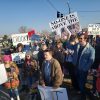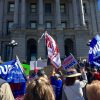On Sunday afternoon during a virtual forum, several of Boulder’s City Council candidates answered a wide range of questions on gun safety, workers’ rights, and other issues.
The forum was hosted by the Colorado branch of Progressive Democrats of America (PDA), a political organization which bills itself as a grassroots organization aiming to revitalize the Democratic party. On the PDA’s website, it states, “We seek to build a party and government controlled by citizens, not corporate elites—with policies that serve the broad public interest, not just private interests.”
In an email message about the forum, a representative of Colorado PDA wrote, “This forum is to educate voters and is not an endorsement of any individual candidate.”
The four candidates of the “progressive coalition,” Matt Benjamin, Lauren Folkerts, Nicole Speer, and Dan Williams, all attended the forum. They were joined by two other candidates: Jacques Decalo and Tara Winer.
According to members of Colorado PDA, the other four candidates were unavailable. Those candidates were Michael Christy, Steve Rosenblum, David Takahashi, and Mark Wallach.
Additionally, Winer left soon after the forum began, citing her own scheduling conflicts. Before she left, Winer briefly introduced herself, in addition to typing both her phone number and email in the chat.
READ MORE: Who’s Running in the 2021 Boulder City Council Election and What They’re Talking About
After all the present candidates had introduced themselves, a moderator from Colorado PDA asked three rounds of questions.
During the first round, candidates were asked to answer questions in no more than a minute. Issues discussed included preferred management styles, mask mandates, gun control, engagement with CU Boulder students, wage equity, homelessness in Boulder, and regulation for local fossil fuel operators.
When asked about gun control, Benjamin and Williams both spoke in support of reinstating Boulder’s assault weapons ban, which was struck down by the Colorado Supreme Court earlier this year. Benjamin also talked about investing in mental health services. Williams mentioned a ban for concealed carry, which was met with a thumbs up from Benjamin.
“That should be something we can get close to consensus on,” Williams commented.
On that subject, Speer brought up two points, which she said a volunteer from Moms Demand Gun Action had mentioned: requiring guns to be locked even when inside cars, and instating a mandatory waiting period before purchasing guns.
Next was a lightning round, with candidates asked to answer with only a yes or no. Several topics were brought to the table, with near-universal agreement on most of them:
- Raising the minimum wage to $18/hr: all candidates said yes.
- Boulder’s racial equity plan, adopted by City Council in February: all candidates said they had read it, except for Decalo, who said he had not read it.
- Flying a Pride flag in front of city hall: all candidates said yes.
- Adopting an improved Medicare for All resolution on a local level: all candidates said they were uncertain if it was feasible. Folkerts said that she would be interested in a local implementation if possible.
- Creating a public defense fund for immigrants: all candidates said yes.
The third round returned to the style of the first, once again asking candidates to answer questions in under a minute. Topics discussed included giving aid to Afghan refugees arriving in Colorado, paying workers a living wage, and fracking.
On the subject of workers’ rights, most candidates agreed that workers should be paid more and treated better.
“Since the COVID crisis started, people are reassessing whether to work in jobs where they’re not respected, or that aren’t rewarding for them,” Williams said. “I think we’re actually at a point in history where we’re rethinking work and how we work. … I think living wage is a piece of that, but frankly, I think there’s a lot more to it than that.”
Decalo called attention to European work standards, saying that “[Americans are] in a capitalistic society that just pushes us to work and work and work and not do anything for ourselves, so we have to have more mental health outreach in work as well. [We need] increased paid vacation, increased paid time off, longer maternity leaves.”
“I support a living wage, but … we need to have a robust conversation about what that is and what our employers can support in our community,” Folkerts added.
After this, candidates were given an opportunity to raise any issues that they did not have a chance to discuss.
Williams used this time to talk about his vision for police reform in Boulder.
“We need a police department that is focused on responding to property crime and violent crime,” Williams said. “And what we don’t need, in my view, is a police department that’s responding to all sorts of different problems, from nuisance complaints on the Hill to people spending time by Boulder Creek drinking or engaging in other behaviors that are citeable as offenses, but really this isn’t a solution that’s going to solve the problem.”
After this, Benjamin spoke against Ballot Measure 302, titled, “Let the Voters Decide on Annexation of CU South,” which he said would allow Boulder voters to block “a massive climate resiliency project that protects the lives of 2,300 people.”
Measure 302 refers to the CU South annexation, approved by a City Council vote last month. As part of this agreement, the city of Boulder is purchasing several acres of land from the University of Colorado in order to build a flood mitigation project, among other reasons.
Decalo disagreed with Benjamin, saying that “A 100-year flood mitigation plan is not enough. We should have done 500 years or 1000 years. … If we build on these waterways and on these channels, it’s going to push water to other parts of Boulder and other parts of the wetland … What we have to do is restore that land to its proper wetland form and increase flood mitigation efforts.” As an alternative, Decalo proposed developing land in North Boulder.
In the chat, Benjamin responded that “500 yr or 1000 yr [flood mitigation] is not possible given the existence of Hwy 36. We should trust our engineers and experts that have recommended the currently agreed upon annexation agreement. If we trust experts on masks, we trust experts on engineering for flood protection.”
Decalo also voiced a concern about the Bedrooms Are For People ballot initiative, which would change Boulder’s occupancy laws to allow more than three unrelated people to live in the same house.
“I agree that the occupancy limits are restrictive for what Boulder needs, I’m just a bit worried that these big companies are going to come in and … build them out into max bedroom capacity places,” said Decalo. “It’s going to benefit the students more than it’s going to benefit local residents… We have to create a balance that works for everyone in this city, because it’s such a divided issue.”
Speer responded, “I consider students to be local residents … it is just as important that they have affordable places to live here as it is for a young family or someone else.”
Afterward, all candidates were given time to make their closing remarks.
“[Ballots] should be coming next Tuesday or Wednesday,” Williams said. “Please vote. Please participate in the process. It’s hard in an off-year election to get the participation that we want, but Boulder does really well with voting, and it’s critical.”
Additional highlights have been posted on the Twitter feed of Junie Joseph, Boulder’s current Mayor Pro Tem.




